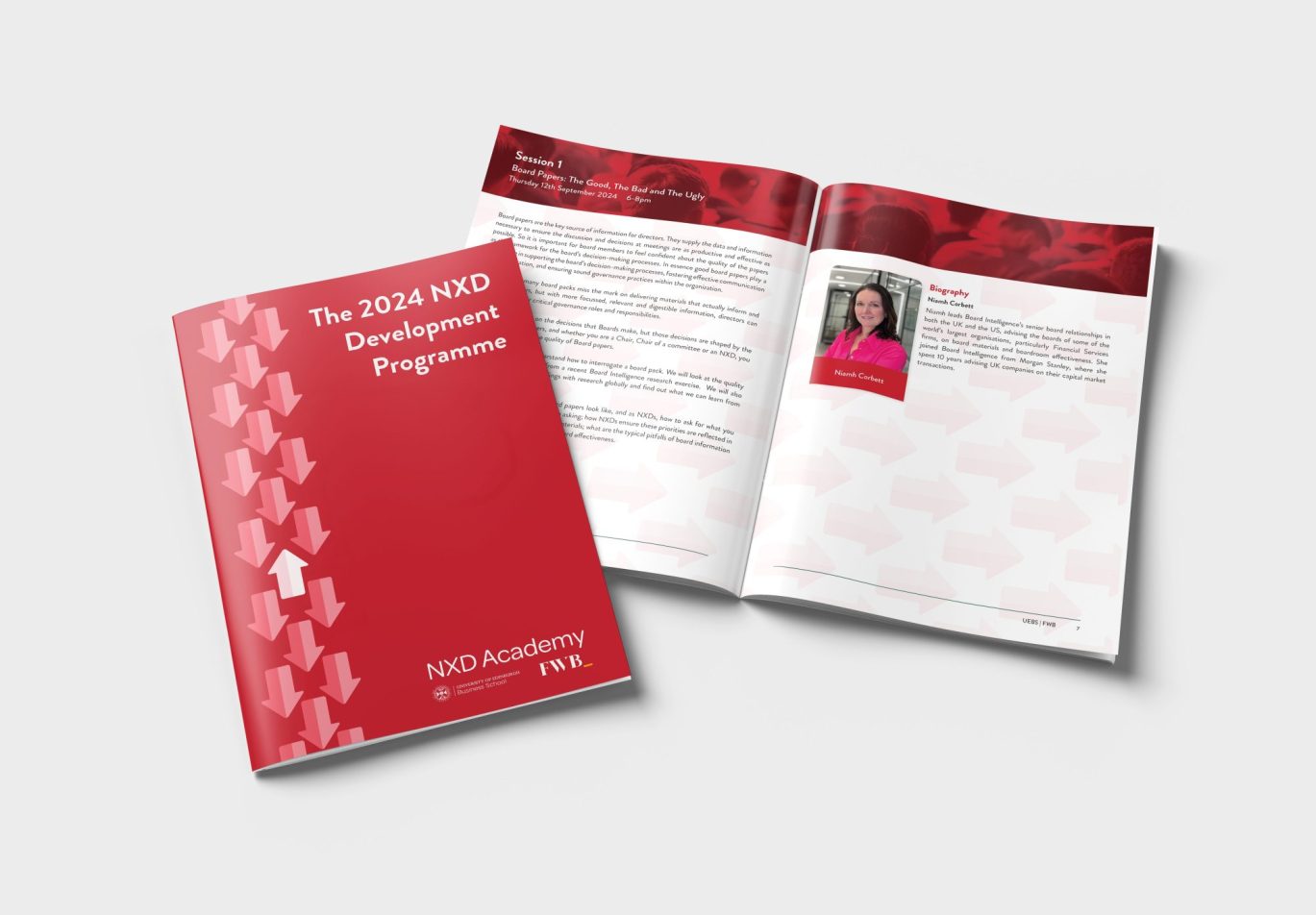Contact the team at FWB to discuss your individual or company requirements, or to discover more about our specialist services.
The Role of the NXD in Assessing Risk
10 October 2024
- Leadership Development

The NXD Development Programme continued with a session focused on the role of the NXD in assessing risk. The session explored this important topic in relation to corporate risk and the growing impact of geopolitical risk on organisations.
The guest speakers were Angus Cockburn and Bill McCall. Angus led the first part of the session focusing on the Board’s and NXD’s role in corporate risk management, and Bill discussed the challenges of geopolitical risk in the second part, followed by group discussions addressing case studies presented by the speakers and a robust and engaging Q&A session.
.
Angus Cockburn

Angus Cockburn is the Non-Executive Chairman of the shipping, oil and gas services business, James Fisher and Sons plc, having started in the role in May 2021. He is also Senior Independent Director of plant rental FTSE 30 business, Ashtead Group plc and Senior Independent Director of the privately owned Edrington Group Limited, which is a global drinks business with brands such as Macallan, Highland Park, No.3 Gin and Brugal rum. Additionally, Angus has recently become a NonExecutive Director of BAE Systems plc.
Bill McCall

Bill Mccall is an experienced Company Director, Investor and Advisor and has worked with and for a range of private equity organisations. He has chaired a number of businesses in the UK & mainland Europe, US and the Nordic Countries and has considerable knowledge of international energy markets. He has chaired public and private boards with complex dynamics and multiple shareholder objectives, keeping clean lines of fiduciary duty, conflict and dispute resolution. He is the Principal of McCall & Partners, a strategic corporate finance advisory business, and Editor of Coffee House Economics. Bill was elected an individual member of the London Stock Exchange in 1990, is a Chartered Banker and Fellow of the Chartered Banker Institute, where he is past President. A Fellow of CISI and RSA, Bill is a Liveryman of the Worshipful Company of International Bankers (London) and Freeman of the City of London.
The key points of their excellent presentations are summarised as follows:
Board’s Role in Risk Management:
- Strategic Importance of Risk: Risk management spans every aspect of a business, and NXDs must engage with risk discussions at every meeting. A failure to do so signals a failing board and potentially a failing company.
- Board’s Oversight, Not Management: While management handles risk, the board oversees risk management systems to ensure proper policies, procedures, and transparency about risks. The board defines the company’s risk appetite and ensures the risk management process is well-embedded and effective.
- Enterprise Risk Management (ERM): The board should push for a strong ERM that drives the company’s assurance and controls program. Risk identification should include risk drivers, linkages, and should align with strategic goals, including periodic reviews.
- Emerging and Catastrophic Risks: Boards should focus on emerging risks and catastrophic risks with low likelihood but high impact. These types of risks can be overlooked by management, but are critical to address at the board level.
- KPI-based Reporting: The board needs a robust, KPI-driven risk reporting system that provides predictive insights and ensures risks are mitigated and managed effectively. Each risk should have an owner accountable for managing and reporting.
.
NXD’s Role in Risk:
- Outside Perspective: NXDs offer external experience and perspectives that management might overlook. They can help prevent overconfidence or excessive caution in management’s decision-making, and highlight emerging risks.
- Holistic Risk View: NXDs should encourage management to integrate risk considerations naturally into decision-making and strategic discussions. They ensure that risk features in board papers and hold management accountable for risk mitigation and reporting.
- Reputation Risk: NXDs can bring an external stakeholder viewpoint, particularly around reputation risk, helping challenge management decisions if they seem too risky reputationally.
- Learning from Mistakes: When things go wrong, NXDs play a key role in ensuring the company learns from its mistakes and strengthens its risk management.
.
Adding Value Beyond Process:
- Creating a Risk-Conscious Board: A diverse, intellectually strong board can create risk awareness that drives swift identification and responses to changes in risk exposure.
- Simplify Risk Discussions: Avoid overly complex risk reports. The board should push for clear, specific papers that outline risks and KPIs for tracking.
- Challenging the Status Quo: Disagreements on risk issues can lead to better decision-making, and NXDs are essential in promoting healthy debate and diverse opinions.
.
Overall, Angus emphasised that risk management is central to a company’s future success, and done correctly, it can create significant opportunities.
.
Geopolitical shifts and risk
Bill highlighted the growing impact of geopolitics on business risk, especially for companies that rely on global supply chains and operate in numerous countries. The past decade has seen significant geopolitical shifts due to increased global interconnectedness. Key drivers of change include competition, technological advancements, and demographic changes, with a particular focus on population growth and resource scarcity.
Technological Change: He emphasizes the profound impact of technology, noting that major shifts like the rise of the internet and AI have reshaped industries. AI, in particular, is set to replace many white-collar jobs, much like earlier technological revolutions affected blue-collar work. This shift is expected to lead to changes in productivity, especially in developed economies.
Demographics: Bill stressed the importance of demographic changes, pointing out the aging populations and declining birth rates in Western nations, including Japan. This contrasts with population growth in countries like India, and overall, the world is seeing significant population movement, which is creating new geopolitical challenges.
Impact of Globalization on Supply Chains: He addressed how globalization and supply chain disruptions, as seen during Covid, have highlighted vulnerabilities. The competition for resources and the demographic shifts will further exacerbate these challenges.
Space Industry and Geopolitics: Bill also touched on the significance of the space industry in geopolitical dynamics, noting that space exploration has historically driven technological advancements. He predicted continued innovation and competition in this area, which could lead to new technologies but also potential conflicts.
Polarization and Government Intervention: He observed that defining “the West” is becoming increasingly difficult, especially with the rise of authoritarian regimes. He suggested that we’re entering a period of greater government intervention, drawing parallels to the New Deal era in the US. This shift toward more government planning and control, particularly in response to aging populations and economic challenges, will likely shape the future of Western economies.
.
.
Our NXD Development Programme continues with the following sessions:
Session 3 (Thursday 10 October 2024, 6-8pm) – “AI – opportunity or threat? What NXDs need to know”
Session 4 (Thursday 24 October 2024, 6-8pm) – “The opportunity and challenges of being an NXD in a Private Equity backed business”
Session 5 (Thursday 7 November 2024, 6-8pm) – “Energy transition strategies and climate reporting: The escalating challenge for Boards and NXDs”
Session 6 (Thursday 21 November 2024, 6-8pm) – “The Effective Board”
.
.
For details of the programme and to register for future sessions, please click here.
For enquiries, please email Laura at nxd@fwbltd.com.
.
This is the 7th year of the FWB / UEBS NXD Academy’s NXD Development Programme which focuses on current challenges and opportunities that Boards are facing. Led by experienced Chairs and NXDs, it is aimed at those interested in all types and sizes of organisation; listed, private, entrepreneurial, SMEs, public sector and not-for-profit. Each session is interactive with small group activities and real-life case studies, together with plenary discussion and Q&A. These sessions have been designed to allow plenty of time for interaction and active learning in all areas. Whilst each session has a main topic, the discussions and questions will be wide-ranging.
.

Course Brochure
Download a copy of the course brochure




